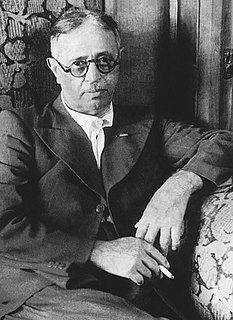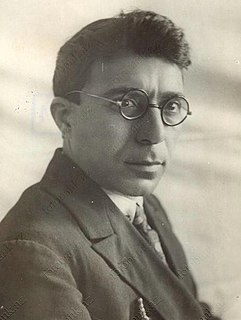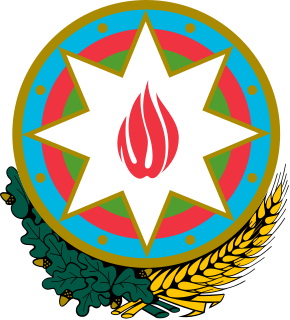
Azerbaijan, officially the Republic of Azerbaijan, is a transcontinental country located at the boundary of Eastern Europe and Western Asia. It is a part of the South Caucasus region, and is bounded by the Caspian Sea to the east, Russia to the north, Georgia to the northwest, Armenia and Turkey to the west, and Iran to the south. Baku is the capital and largest city.

Azerbaijan, officially the Azerbaijan Soviet Socialist Republic, also referred to as Soviet Azerbaijan, was one of the constituent republics of the Soviet Union between 1922 and 1991. Created on 28 April 1920 when the Russian Soviet Federative Socialist Republic brought pro-Soviet figures to power in the region, the first two years of the Azerbaijani SSR were as an independent country until incorporation into the Transcausasian SFSR, along with the Armenian SSR and the Georgian SSR.

Uzeyir bey Abdulhuseyn oghlu Hajibeyli, known as Uzeyir Hajibeyov was an Azerbaijani composer, conductor, publicist, playwright, and social figure. He is recognized as the father of Azerbaijani composed classical music and opera. Uzeyir Hajibeyov composed the music of the national anthem of Azerbaijan Democratic Republic. He also composed the anthem used by Azerbaijan during the Soviet period. He was the first composer of an opera in the Islamic world. He composed that first oriental opera Leyli and Majnun in 1908 and since then Azerbaijani people have been honored him for bringing t to life the written masterpiece of the world literature.

The Azerbaijan Democratic Republic was the first secular democratic republic in the Turkic and Muslim worlds. The ADR was founded by the Azerbaijani National Council in Tiflis on 28 May 1918 after the collapse of the Transcaucasian Democratic Federative Republic, and ceased to exist on April 28, 1920. Its established borders were with Russia to the north, the Democratic Republic of Georgia to the north-west, the Republic of Armenia to the west, and Iran to the south. It had a population of around 3 million. Ganja was the temporary capital of the Republic as Baku was under Bolshevik control. The name of "Azerbaijan" which the leading Musavat party adopted, for political reasons, was, prior to the establishment of the Azerbaijan Democratic Republic in 1918, exclusively used to identify the adjacent region of contemporary northwestern Iran.

The National Assembly, also transliterated as Milli Mejlis, is the legislative branch of government in Azerbaijan. The unicameral National Assembly has 125 deputies: previously 100 members were elected for five-year terms in single-seat constituencies and 25 were members elected by proportional representation; as of the latest election, however, all 125 deputies are returned from single-member constituencies.

Ahmad Javad was an Azerbaijani poet who is best known for writing the words of the National Anthem of Azerbaijan used under the 1918–1920 Democratic Republic of Azerbaijan, and again since 1991, and another poem named Chirpynirdi gara deniz.
The Armenian–Azerbaijani War, which started after the Russian Revolution, was a series of conflicts in 1918, then from 1920 to 1922, that occurred during the brief independence of Armenia and Azerbaijan, and afterwards. Most of the conflicts did not have a principal pattern with a standard armed structure. The Ottoman Empire and British Empire were involved in different capacities: the Ottoman Empire left the region after the Armistice of Mudros but British influence continued until Dunsterforce was pulled back in the 1920s. The conflicts involved civilians in the disputed districts of Kazakh-Shamshadin, Zanghezur, Nakhichevan and Karabakh. The use of guerrilla and semi-guerrilla operations was the main reason for the high civilian casualties, which occurred during the nation-building activities of the newly established states.

Jafar Gafar oglu Jabbarly, was an Azerbaijani playwright, poet, director and screenwriter.

Cinema of Azerbaijan dates back to the 19th century. Azerbaijan is one of the first countries in the world involved in cinematography. The first Azerbaijani film was a thirty second long silent film called The Oil Gush Fire in Bibiheybat, which was recorded using the cinematograph.

Ministry of Foreign Affairs of Azerbaijan is a Cabinet-level governmental agency in Azerbaijan Republic in charge of conducting and designing Azerbaijani Foreign policy.

Azerbaijanfilm is an Azerbaijani state film production company. It is located in the capital Baku.
The mass media in Azerbaijan refers to mass media outlets based in the Republic of Azerbaijan. Television, magazines, and newspapers are all operated by both state-owned and for-profit corporations which depend on advertising, subscription, and other sales-related revenues.

Azerbaijanis in Armenia were once the largest ethnic minority in the country, but have been virtually non-existent since 1988–1991 when most either fled the country or were pushed out as a result of the First Nagorno-Karabakh War and the ongoing conflict between Armenia and Azerbaijan. UNHCR estimates the current population of Azerbaijanis in Armenia to be somewhere between 30 and a few hundred people, with the majority of them living in rural areas and being members of mixed couples, as well as elderly or sick. Most of them are reported to have changed their names to maintain low profiles to avoid discrimination.
The anti-Azerbaijani sentiment, or anti-Azerbaijanism has been mainly rooted in several countries, most notably in Armenia and Iran, where anti-Azerbaijani sentiment has sometimes led to violent ethnic incidents.
This page is based on this
Wikipedia article Text is available under the
CC BY-SA 4.0 license; additional terms may apply.
Images, videos and audio are available under their respective licenses.











